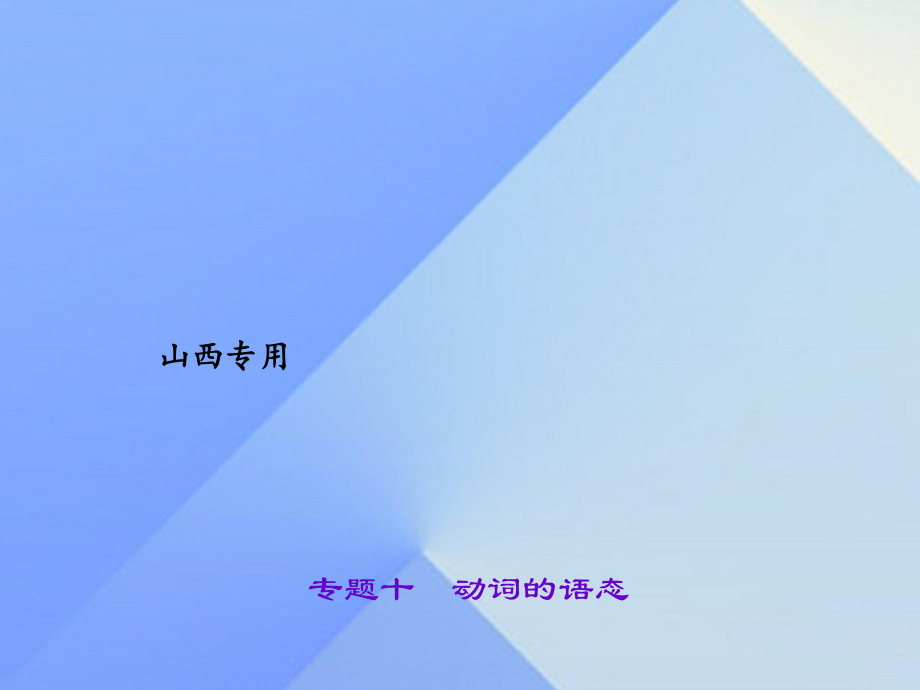《中考英語(yǔ) 第二輪 語(yǔ)法專(zhuān)題聚焦 專(zhuān)題十一 非謂語(yǔ)動(dòng)詞課件1》由會(huì)員分享�,可在線(xiàn)閱讀,更多相關(guān)《中考英語(yǔ) 第二輪 語(yǔ)法專(zhuān)題聚焦 專(zhuān)題十一 非謂語(yǔ)動(dòng)詞課件1(7頁(yè)珍藏版)》請(qǐng)?jiān)谘b配圖網(wǎng)上搜索��。
1��、專(zhuān) 題 十 動(dòng) 詞 的 語(yǔ) 態(tài)山 西 專(zhuān) 用 1被動(dòng)語(yǔ)態(tài)的構(gòu)成語(yǔ)態(tài)被動(dòng)結(jié)構(gòu)例句一般現(xiàn)在時(shí)的被動(dòng)語(yǔ)態(tài)be(am/is/are)動(dòng)詞的過(guò)去分詞This kind of car is made in China.這種車(chē)是中國(guó)制造的�。一般過(guò)去時(shí)的被動(dòng)語(yǔ)態(tài)be(was/were)動(dòng)詞的過(guò)去分詞The flying disk was invented by college students這種飛碟是大學(xué)生們發(fā)明的���。一般將來(lái)時(shí)的被動(dòng)語(yǔ)態(tài)will/shallbe動(dòng)詞的過(guò)去分詞The bridge will be finished in a month.這座橋?qū)⒃谝粋€(gè)月后竣工。情態(tài)動(dòng)詞的被動(dòng)語(yǔ) 態(tài)情態(tài)動(dòng)詞be動(dòng)
2�����、詞的過(guò)去分詞Tables can be made of stone.桌子可由石頭制成�。 2需要使用被動(dòng)語(yǔ)態(tài)的情況:在不知道動(dòng)作的執(zhí)行者是誰(shuí)時(shí)。如:These books are written for children.這些書(shū)是為孩子們編寫(xiě)的���。(誰(shuí)寫(xiě)的不知道)當(dāng)動(dòng)作的執(zhí)行者是泛指或不言自明時(shí)����。如:China was liberated in 1949.1949年中國(guó)解放��。(不言而喻是中國(guó)共產(chǎn)黨解放的)雖然可以說(shuō)出動(dòng)作的執(zhí)行者��,但動(dòng)作的承受者是談話(huà)中心或特別需要強(qiáng)調(diào)時(shí)�。如:My watch has been repaired.我的表修好了。(表修好了是談話(huà)的主旨�����,是誰(shuí)修好的則不必提及) 出于委婉
3�����、�����、禮貌而避免提及自己或?qū)Ψ?。如:You are wished to do it more carefully.希望你認(rèn)真一點(diǎn)兒做。(誰(shuí)希望�����,不愿或不便說(shuō)出來(lái))當(dāng)人不是動(dòng)作的執(zhí)行者時(shí)����。如:We are all shocked by the news of his sudden death.他的突然去世使我們大家都感到震驚。 3主動(dòng)語(yǔ)態(tài)與被動(dòng)語(yǔ)態(tài)的互相轉(zhuǎn)換主動(dòng)語(yǔ)態(tài):動(dòng)作執(zhí)行者動(dòng)詞主動(dòng)形式動(dòng)作承受者被動(dòng)語(yǔ)態(tài):動(dòng)作承受者動(dòng)詞被動(dòng)語(yǔ)態(tài)動(dòng)作執(zhí)行者如:We asked him to sing an English song.(變?yōu)楸粍?dòng)語(yǔ)態(tài))He was asked to sing an English so
4�、ng by us.我們叫他唱首英文歌?����!咀⒁狻磕承﹦?dòng)詞形式是主動(dòng)語(yǔ)態(tài)���,但含有被動(dòng)的意思�����。如:The dictionary sells well.這本字典賣(mài)得好�。The sweater costs $ 88.這件毛衣賣(mài)88美元。主動(dòng)語(yǔ)態(tài)中有些動(dòng)詞��,如:make���, see�, listen�, watch, feel后跟省to的不定式作賓補(bǔ)��,變?yōu)楸粍?dòng)語(yǔ)態(tài)時(shí)要帶上to����。如: He made the boy laugh.The boy was made to laugh by him.那個(gè)男孩被他逗笑了。 動(dòng)詞短語(yǔ)變?yōu)楸粍?dòng)語(yǔ)態(tài)時(shí)�����,動(dòng)詞短語(yǔ)后的介詞或副詞不能省略�����。如:The baby was looked
5、after by her sister.那個(gè)嬰兒由她姐姐照顧���。4不能使用被動(dòng)語(yǔ)態(tài)的情況連系動(dòng)詞,如:look��, feel����, smell等,以主動(dòng)形式表示被動(dòng)含義��。如:The flower smells sweet.這花聞起來(lái)很香���。The watch looks good.這表看起來(lái)很好����。有些詞組的主動(dòng)形式表被動(dòng)含義���,如:need doing sth.(需要做某事)���, be worth doing sth.(值得做某事)等。如:Your bedroom is much mess.It needs cleaning right now.你的臥室太亂了�,需要馬上打掃一下����。 表示“發(fā)生”的happen
6���、或take place���,無(wú)被動(dòng)語(yǔ)態(tài)。如:故事發(fā)生在一個(gè)寒冷的夜晚�����。The story happened on a cold night.()The story was happened on a cold night.() 1 Food safety is very important.More rules should _in China.A make Bbe makingCbe made2 An expert team _to study H7N9 bird flu virus in April��, 2013.A is set up Bwas set up Chas set up3 The sports meeting _next month.A will hold Bis going to hold Cwill be held4 Boys and girls���, the books in the library should _ good care of.A be taken Btake Care taking5 Do you know when the first train _ in China?A was produced Bis produced C producedCB C AA
 中考英語(yǔ) 第二輪 語(yǔ)法專(zhuān)題聚焦 專(zhuān)題十一 非謂語(yǔ)動(dòng)詞課件1
中考英語(yǔ) 第二輪 語(yǔ)法專(zhuān)題聚焦 專(zhuān)題十一 非謂語(yǔ)動(dòng)詞課件1

